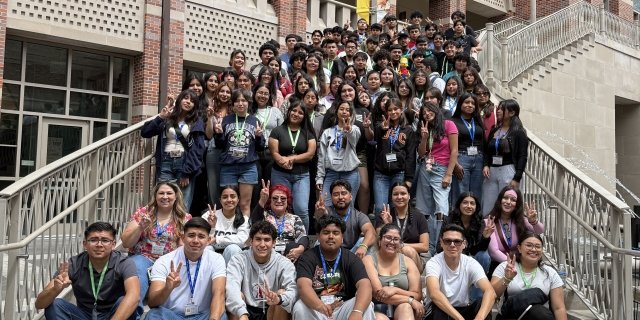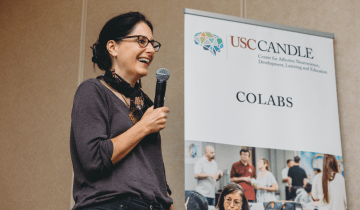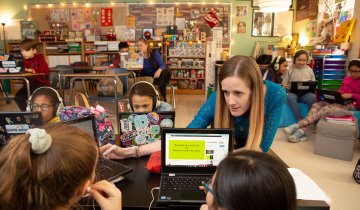- Faculty & Research
- Research at USC Rossier
Research at USC Rossier

Research Concentrations
USC Rossier is unique among schools of education at major research universities in the way the faculty are organized. There are no departmental “silos” that discourage big picture and interdisciplinary work. Rather, we work together as one faculty, grouping ourselves into four fluid thematic areas based on expertise and current interests.
In addition, tenure track, clinical and research faculty work alongside each other to develop and continuously improve our programs, shape research projects and participate in a full array of university and professional service activities in the four general categories.
About the Higher Education Concentration at Rossier
The Higher Education concentration at USC Rossier School of Education is one of the most widely recognized and respected in the nation. Its prestige can be attributed to the esteemed faculty whose work falls within this concentration. The research, scholarship and publications of higher education faculty members and major research centers under this concentration, are world-renowned.
Faculty
Faculty in the Higher Education Concentration have held leadership positions in the Association for the Study of Higher Education, American Educational Research Association, American Association for Higher Education and Association of American Colleges and Universities. They have served on the editorial boards of the Review of Higher Education, Journal of Higher Education, Journal of College Student Development, Change and The ERIC Review, and served as reviewers for the Institute for Educational Sciences and the National Science Foundation.
Their body of work and expertise includes the areas of organizational change and academic leadership, equity in educational outcomes, women and minority faculty, faculty evaluation and compensation, political-economic issues of public college finance equity, organizational effectiveness, sexual harassment in the academy, intercollegiate athletics, student development, remediation and college-readiness, access to college and governance in higher education, among many other specialties.
Research Centers
- Pullias Center for Higher Education
- Center for Education, Identity, and Social Justice
- Center for Enrollment Research, Policy and Practice
Programs
PhD
Within the PhD program, students with interest in higher education policy explore research in the areas of college access and equity, organizational productivity and leadership, fiscal management, ethical and legal issues, college student development, and enrollment and retention at four-year institutions and community colleges.
EdD
The EdD program includes a Higher Education Administration focus designed for individuals pursuing careers in senior administrative and academic leadership positions at two- and four-year colleges and universities.
Masters
The Master of Education in Postsecondary Administration and Student Affairs (PASA) program gives students the opportunity to develop proficiency in Student Affairs, Academic Advising, or Athletic Administration.
About the K–12 Education Policy and Leadership Concentration at USC Rossier
At the leading edge of education policy research and reform are our faculty in the K–12 Education Policy concentration, whose work informs local, state and national legislation and helps shape education policy and practice nationally and internationally. Our faculty combines some of the nation’s leading K–12 policy scholars working on major current issues in K–12 education policy, with distinguished educational leaders who have themselves led major school districts and other institutions. This unique blend of research and clinical faculty work together in developing programs designed to help graduates improve educational equity through research, policy and practice.
Focus
Faculty in the K–12 Education Policy and Leadership concentration specialize in studying school reform, racial justice initiatives, school choice policies and privatization, teacher policies, public school finance, standards and curriculum reform, governance, school leadership, public opinion on education policy, and educational entrepreneurship. Our faculty are interested in a wide array of questions including the effects of reforms on outcomes (overall and especially for students from historically marginalized groups), as well as the processes of policy making, policy implementation and organizational change. Faculty also seek to interrogate dynamics of power and the role of racism within and across communities and education systems, and investigate the ways in which educators address systemic racial outcome and opportunity gaps and structural racism in the context of education policies that are typically race-neutral. In order to address these questions, our faculty use qualitative, quantitative, and mixed methods, drawing on their backgrounds in economics, educational measurement, political science, sociology and policy analysis.
Research
Some of the research conducted by faculty who specialize in K–12 issues falls within the Center on Education Policy, Equity and Governance (CEPEG), which conducts rigorous, policy- and practice-relevant research that advances educational equity for California K–12 students—with an emphasis on greater Los Angeles—and to create partnerships that ensure education policies, practices and governance structures are guided by evidence and careful analysis. In partnership with Policy Analysis for California Education (PACE), USC Rossier faculty have led education policy conferences at USC, seminars in Sacramento and congressional policy briefings in Washington, D.C. PACE and USC Rossier also co-lead an annual public opinion poll of California voters that helps inform the policy agenda in the state and beyond.
Faculty
Tenure Track
Our tenure track faculty in the K–12 area have served in leadership positions in the American Educational Research Association, Association of Education Finance and Policy, the RAND Corporation and the National Education Policy Center. They have edited and served on the editorial boards of major education policy journals, such as Educational Evaluation and Policy Analysis, Journal of Education Policy, AERA Open, Educational Administration Quarterly, American Educational Research Journal,Educational Researcher and the Elementary School Journal. Faculty have also received major grants from the field’s most prestigious and competitive funders to study a wide range of policy topics, such as standards-based reform and after-school tutoring (Institute of Education Sciences), governance change and online learning (Spencer Foundation), school choice, organizational response to COVID-19 and racial injustice (Institute of Education Sciences), instructional coaching and data use (Spencer Foundation), the impact of COVID-19 on education (National Science Foundation, Hewlett Foundation) and educational rights in youth prisons (Chan Zuckerberg Foundation) .
Clinical
Our clinical faculty in the K–12 concentration have run major urban school districts where they have led dramatic change and implemented transformative measures to improve student achievement. Faculty have led districts and organizations that include the New York City Department of Education, the Hawaii State Department of Education, the Western Association of Schools and Colleges accrediting agency, and several districts that are among the largest in the nation. The clinical faculty have been recognized as some of the best educational leaders in the country. They have led initiatives to increase student achievement, expand racial equity and social justice, relieve overcrowded schools, and integrate instructional technology.
Programs
PhD
K–12 faculty contribute to several programs within the school. The PhD program in Education blends expertise across the school in four core concentrations. The program allows for a focus in research centered on policy and practice in K–12 education and the examination of influences and processes related to leadership, governance, finance, teaching and learning, racial equity and social justice, and organizational change in K–12 settings.
EdD
The EdD program includes a focus on K–12 Leadership in Urban School Settings designed for current and prospective K–12 site and district administrators and/or those working with educational policy and practice at local, state and federal levels.
About the Psychology in Education Concentration at USC Rossier
The focus of the Psychology in Education concentration is on learning, motivation, instructional technology, assessment and mental health issues in urban education. Much of the research and scholarship that guides teacher education, educational administration and student affairs stems from the fields of psychology in education and counseling, emphasizing the importance of these fields to educational practitioners.
Faculty
Faculty expertise in this broad area expands to marriage and family therapy, school counseling, learning theory, cognitive technology, educational measurement, performance assessment, school violence, test anxiety, motivation, cross-cultural learning, human development, cognitive science, self-regulation, and social and cultural influences on the classroom.
Among our psychology in education faculty are leading experts in a range of subjects, including: cognitive neuroscience and the study of the brain bases of emotion, social interaction and culture and their implications for development, curriculum and pedagogy, computer-based simulations and games for training and learning, and the study of complex adult learning and problem-solving.
Editorial Boards
Our psychology in education faculty serve on numerous boards of major journals in the field, including American Educational Research Journal, Review of Education Research, Journal of Literacy Research, Learning Disabilities Research & Practice, and Mind, Brain and Education. Our faculty have also been recognized as fellows of the American Psychological Association, the Association of Applied Psychology, the American Psychological Society, the Association for Psychological Science, and American Educational Research Association.
Programs
PhD
The PhD program in Urban Education Policy includes research in the areas of learning and motivation, especially how people learn, what motivates them, what instructional and motivational strategies are most effective for individuals from different cultures, and how the social context of instruction affects learning.
EdD
The EdD program includes a focus in Educational Psychology designed for professionals in K–12, higher education, and business, military, and government organizations who seek to improve the motivation, achievement, performance and retention of diverse learners by focusing on research and practice in the areas of learning and motivation in diverse social contexts.
Masters
The Educational Psychology concentration also includes the Master of Marriage and Family Therapy program. Research centered on the relationship between technology and learning is prolific in the Center for Cognitive Technology (CCT), which studies the role of new technology in the development of advanced expertise and performance motivation.
About the Teacher Education Concentration at USC Rossier
Teacher Education concentration faculty specialize in three major activities: preparing teachers through our master’s programs, preparing future teacher educators through our EdD program, and preparing future researchers and professors in our PhD program.
From innovative online teacher preparation (like the MAT online program) to preparing instructors of English as a Second Language, this concentration brings together the best research and brightest minds in the profession.
Courses and research within the Teacher Education concentration use educational psychology and learning theory as a lens for understanding student and teacher learning. Teacher Education also intersects with USC Rossier’s K–12 Education Policy concentration through its focus on the critical role that policy plays in K–12 teaching in urban settings, and the preparation of teachers for high-needs schools.
In the roles of tenured professor, adjunct professor, academic coach, supervisor, master teacher, curriculum specialist or professional staff developer, graduates of the Teacher Education concentration have both a depth and breadth of knowledge that emphasizes the design and evaluation of all types of teacher preparation programs.
Programs
PhD
The PhD in Urban Education Policy program includes a focus on Teacher Education with research on teacher knowledge, teaching practices and teacher development, and how these areas relate to student learning.
EdD
USC Rossier’s EdD program offers an opportunity to specialize in Leading Instructional Change, specifically geared towards preparing leaders in the field of pre-service and/or in-service teacher preparation. The program focuses on equitable learning for culturally and linguistically diverse students in urban settings.
By moving between theory, practice and policy, concentration courses prepare learners to contribute to teacher education, whether in university-based teacher education programs or as curriculum leaders in K–12 settings. The courses and field experience in the concentration are constructed to provide prospective teacher/educators with research and theory related to facilitating and assessing teacher learning.
Masters
Building on a long history of teacher preparation, USC Rossier’s innovative Master of Arts in Teaching (MAT) program is offered on-campus and online.
The groundbreaking Master of Arts in Teaching online program was launched in 2009. This program blends the most cutting-edge technology with real-world in-classroom experience, and combines the finest USC-based teacher preparation faculty and curricula with the newest web-based multimedia interactivity. The MAT online program is a highly lauded success and has the potential to change the education landscape by putting more qualified teachers in greater numbers into high-need schools around the country and ultimately around the world.
Other master’s programs include a Master of Science in Teaching English to Speakers of Other Languages (MS–TESOL) which prepares graduates to work as teachers, curriculum specialists and leaders of ESL/EFL programs in the U.S. and abroad.
USC Rossier Research in the News
Endowed Faculty Chairs & Professorships

Shaun R. Harper
Clifford H. and Betty C. Allen Professorship in Urban Leadership

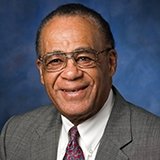
John Brooks Slaughter
Dean’s Professorship in Education & Engineering
In Memoriam 1934-2023

Adrianna Kezar
Dean’s Professorship in Higher Education Leadership Les Wilbur-Evelyn Kieffer Professorship in Higher Education

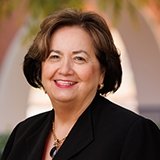
Maria Ott
Irving R. and Virgina Archer Melbo Chair in Educational Administration

Lawrence O. Picus
Richard T. Cooper and Mary Catherine Cooper Chair in Public School Administration
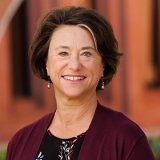
Gale M. Sinatra
Stephen Crocker Professorship in Education and Distinguished Professor



Yasemin Copur-Gencturk
Katzman/Ernst Chair for Educational Entrepreneurship, Technology and Innovation

Research Funding Awarded
- Morgan Polikoff is the co-principal investigator on a $400,000 grant from the Overdeck Family Foundation on the "Understanding America Study."
- Huriya Jabbar was awarded $375,000 from the Spencer Foundation Large Grants Program for a project titled, “The Emergence and Consequences of Culture Wars and Curriculum Conflicts in Education.”
- Julie Marsh received a grant from the Smith Richardson Foundation for the project, “The Quiet Revolution of School Vouchers and ESAs.”
- Mabel Hernandez was awarded a 2025 Faculty Fellowship from the Haynes Foundation for the proposal, “Academic Help-Seeking and Belonging among Asian and Latinx Undergraduates in Los Angeles.”
- Mary Helen Immordino-Yang was awarded $2.1M dollars from the Bezos Family Foundation in support of CANDLE’s mission to leverage developmental neuroscience in ways that will create transformative and scalable educational practices.
- Morgan Polikoff received more than $1M dollars from the Bill and Melinda Gates Foundation, for the project, “Expanding Quality Signals and R&D Infrastructure.”
- Shaun Harper was awarded $500,00 from the College Futures Foundation for the proposal “Commission for Racial Equity in California's Community College.”
- Steven Desir, the Center for Enrollment Research, Policy, and Practice (CERPP)—in partnership with the American Association for the Advancement of Science and Education Counsel was awarded a $685,000 grant from the Alfred P. Sloan Foundation for a project to develop an equity-minded, law-attentive organizational learning series.
- Adrian Huerta, partnering with the USC Keck School of Medicine, is the recipient of a $50,000 grant from the California Community Foundation to develop strengths-based programs for engaging gang-involved youth and their caregivers.
- Adrian Huerta received $50,000 from the California Community Foundation to focus on gang-involved children in LA K-12 schools, with Daniel Soto.
- Adrianna Kezar was awarded a $399,994 grant from ECMC Foundation for the proposal “Building Capacity for Shared Equity Leadership to Support Student Success.”
- Adrianna Kezar and her team won a $600,000 grant from the Bill and Melinda Gates Foundation to expand the Change Leadership Toolkit.
- Adrianna Kezar and the Pullias Center received $200,000 from the National Science Foundation for additional data analysis on the Faculty, Academic Careers and Environments project.
- Brendesha Tynes was awarded a $4.6M NIH grant to build the nation’s first digital literacy and mental health platform for K–12 students.
- Darnell Cole and collaborators were awarded a $50,000 LEVER grant from the Abdul Latif Jameel Poverty Action Lab to conduct a randomized control trial evaluating the Student Engagement, Exploration, and Development in STEM program, for middle school and college students.
- Erika Patall received a $3M grant to study the effectiveness of promoting student agency to bolster diversity in STEM classes.
- Huriya Jabbar was awarded a $75,000 Spencer Foundation Vision Grant for her research examining the effects of blending school and housing policies to bolster housing stability for vulnerable families.
- Huriya Jabbar was awarded $50,000 from the USC Zumberge Faculty Research & Innovation Fund for the proposal “Housing, Networks, and Mobility for Low-Income Youth: A Study of the Implementation of Federal Housing Investments to Reduce Inequality in Detroit.”
- Huriya Jabbar and collaborators were awarded $600,000 from the William T. Grant Foundation for Housing, Networks, and Mobility for Low-Income Youth: A Study of the Implementation of Federal Housing Investments to Reduce Inequality in Detroit.
- Huriya Jabbar and her collaborators received $442,340 from the American Institutes for Research for the study Moving in Motown: Examining the Promise of Integrated Neighborhoods and Schools Through Detroit’s Choice Neighborhoods Initiative.
- Huriya Jabbar and Sarah Lenhoff were awarded $250,000 from the Urban Institute, Student Upward Mobility Initiative, to study whether it is possible to measure youth social networks with administrative data in Detroit.
- Huriya Jabbar was awarded a $75,000 Spencer Foundation Vision Grant for her research examining the effects of blending school and housing policies to bolster housing stability for vulnerable families.
- Jerry Lucido and Steve Desir were awarded a $50,000 planning grant from the Alfred P. Sloan Foundation for a student-focused law, policy, and research-backed technical assistance project.
- Julie Marsh received a $50,000 grant for Renewing the Promise of a Just, Participatory Democracy: A Collaborative Research-to-Action Project to Support School Boards, from California Community Foundation.
- Julie Marsh received a small grant from the California Community Foundation for Renewing the promise of a just, participatory democracy: A collaborative research-to-action project to support school boards.
- Julie Posselt received $1.2M from the Sloan Foundation to expand the Equity in Graduate Education Consortium.
- Julie Posselt received a $1.3M NSF grant to examine evaluation rubrics and how they affect racial equity outcomes in graduate school admissions.
- Julie Posselt received $244,000 from the Urban Institute, with funding by the Mellon Foundation, for a research-practice collaborative about how to equitably enroll and serve students in the new legal landscape.
- Kendrick Davis, Royel Johnson and Dwuana Bradley were awarded a $1M grant to expand criminal justice prevention research and practice efforts.
- Kendrick Davis received $33,000 from the Information Sciences Institute at the Viterbi School of Engineering to co-lead research and evaluation for the CA DREAMS workforce development initiative.
- Kendrick Davis, Brandi Junious, AJ Mada, Wilmon Christian, and LaNita Gregory Campbell were awarded $300,000 as a sub-grantee of the Keck School of Medicine and Regenerative Patch Technologies (RPT) project, funded by a $12.4 million grant from the California Institute for Regenerative Medicine.
- Mary Helen Immordino-Yang won a grant from the Undergraduate Research Associates Program.
- Shaun Harper received a $2.6 million grant from the ECMC Foundation to study institutional innovations for men of color at four-year colleges and universities. The Kresge Foundation further awarded Harper $60,000 to continue his work on funding inequities at Historically Black Colleges and Universities.
- Shaun Harper received $400,000 for the National DEI Defense Alliance from the Amalgamated Foundation. He also received $500,000 from the Walton Family Foundation to study young men’s post-pandemic college enrollment decisions.
- Shafiqa Ahmadi, Darnell Cole, and Eugenia Mora-Flores received a $250,000 gift from Gordon Philanthropies to evaluate the Communities that Read Together, Grow Together program.
- Stephen Aguilar is partnering on a $4.5M U.S. Army Research Office grant to develop an AI-enhanced dashboard for instructors and students.
- Yasemin Copur-Genturk received $2M from NSF to improve math instruction with AI-driven teacher professional development.
- Yasemin Copur-Genturk was awarded a grant of $152,814 from Knowledgehook for the project "The Role of Knowledgehook in Improving Teaching and Learning Math."
- Yasemin Copur-Genturk, Adam Kho, and a collaborator were awarded $2 million over four years from the Institute of Education Sciences for a Diagnostic Instrument for Teachers’ Content and Pedagogical Content Knowledge of Numbers and Operations for Elementary School Teachers.
- The Center for Enrollment Research, Policy and Practice received two years of funding for the USC College Advising Corps program, $175,000 and $105,000 from LASIF-BROADEN.
- The Center for Enrollment Research, Policy and Practice was awarded multiple service agreements for the USC College Advising Corps, including $197,140 from Glendale Unified School District.
- The Center for Enrollment Research, Policy and Practice received $213,949 from the ECMC Foundation for the USC College Advising Corps program, and service agreements of $725,000 from the national College Advising Corps, $108,000 from Paramount Unified School District, and $30,042 from the Los Angeles Dodgers Foundation.
Adrianna Kezar (Pullias) was awarded $1.5 million from the National Science Foundation to develop and test a national survey on faculty, and academic careers.
Julie Posselt (Pullias) was awarded a $1.3 million grant from the National Science Foundation to examine how the use of rubrics impacts racial equity in graduate admissions.
Jenifer Crawford received $250,000 from the Commission on Teacher Credentialing for the proposal “Integrated Teacher Preparation Program Planning”.
The Race and Equity Center was awarded $758,390 in funding from City Year Los Angeles, Citrus College, California State Polytechnic University Pomona, Otis College of Art and Design, Iovine and Young Center, Wellnest, PUC Lakeview Charter High School, and Achieving the Dream.
Center for Enrollment Research, Policy and Practice was awarded over $1.1 million in funding from the West Covina Unified School District, Lynwood Unified School District, and the College Advising Corps.
Yasemin Copur-Gencturk was awarded a $2 million grant from National Science Foundation for the proposal “Adaptive Program with Just-in-time Feedback for Preservice Teachers” with Michigan State University and University of Georgia.
Stephen Aguilar was awarded $216,000 from the Department of Defense Army Research Office for his research on artificial intelligence and its potential effects on education, with the total awarded contract being over $4 million.
Erika Patall and Stephen Aguilar were awarded a $3.99 million grant from the National Institutes of Health to research student agency in undergraduate biomedical education, a collaboration with colleagues from USC Dornsife, University of Missouri, and Arizona State University.
Morgan Scott Polikoff (CEPEG) and Anna Saavedra were awarded a $173,125 grant from the USC Schaeffer-Peterson Pandemic Policy Research Fund for their work “The long-term effects of COVID-19 and mitigation interventions on children’s well-being: Implications for education policy and future economic productivity.”
Adrianna Kezar and the Pullias Center were awarded a $50,000 grant from the TIAA Institute to expand previous research on Shared Equity Leadership through their “Successfully Enacting Shared Equity Leadership” initiative which will examine challenges to enacting Shared Equity Leadership as well as strategies for overcoming these challenges.
Adrianna Kezarand the Pullias Center were awarded a $250,000 grant from the Alfred P. Sloan Foundation to develop an online interactive curriculum and webinar series, with additional workshop formats and other engagement models to support effective use of the Change Leadership Toolkit (CLT) in promoting systemic change in higher education.
Shaun Harper (Race and Equity) was awarded a Kresge Foundation grant for $400,000 for his proposal, Advancing Racial Equity for Historically Black Colleges and Universities.
Jerry Lucido (CERPP) was awarded a $300,000 grant from the California Community Foundation to support its USC College Advising Corps program, $151,374 to support the USC CAC program in LAUSD high schools through the Partners for Student Success program, and $10,000 from the CTBC Bank for the professional development of college advisers serving in the USC College Advising Corps program.
Morgan Polikoff (CEPEG) and Anna Saavedra were awarded $200,000 from the National Science Foundation for their work in “RAPID: The Impact of COVID on Children’s Well-being in 2022: Continued Evidence from the Understanding America Study.
Tatiana Melguizo (Pullias) received a $299,000 grant from the National Science Foundation to study community college STEM opportunities. She will work with researchers from LACCD’s Pierce College, the University of Nevada, Las Vegas, and the University of Massachusetts, Boston.
Tatiana Melguizo (Pullias) partnered with LACCD and researchers from Harvard’s CEPR for a three-year study on COVID-19 recovery and have been collectively awarded a $2.9 million grant from the Institute of Education Sciences, their study will examine how technology can remake the student experience.
Adrian H. Huerta (Pullias) partnered with UCLA and UC Davis and received a $275,000 grant from the College Futures Foundation to develop a racial equity-centered framework for the California Community College Baccalaureate Degree program.
Stephen J. Aguilar and his colleagues received a grant of more than $690,000 from the National Science Foundation for support of their project, Determining Community Needs for Accessibility Tools that Facilitate Programming Education and Workforce Readiness for Persons with Disabilities.
Shaun Harper (Race and Equity) has been awarded an ECMC Foundation grant of more than $1.8 million for his project on Institutional Transformation for Community College Men of Color Success.ddle and high school Students' scientific evaluation of sources and alternative claims in Earth and environmental sciences.”
Royel M. Johnson (Race and Equity/Pullias) was awarded a research grant from the American Education Research Association, funded by the National Science Foundation for his study named, “Examining the Varying Effects of Juvenile Arrest on College Enrollment for Racially/Ethnically Diverse Youth: The Role of School Level Factors.”
Morgan S. Polikoff was awarded a $139,872 grant from an anonymous foundation (their grant requirements are that they not be named) for her book project “Miseducated: How bad ideas are undermining education, and what parents can do about it.”
Adam Kho (CEPEG) was awarded a $30,000 grant from the Fordham Foundation for his proposal named, "Do Charter Authorizer Evaluations Predict School Success? Evidence from North Carolina."
Pedro Noguera, Adam Kho, Erika Patall, Julie Marsh, and Lam Pham were awarded a Reducing Inequality Grant of $600,000 from the William T. Grant Foundation for their proposal, "Hattie's Influences on Student Achievement Under an Institutionally Racist System: What Works for Black and Brown Students?" Doctoral students Isabel Clay, Margaret Dawson-Amoah, Michael Fienberg, Shelby Smith, Tong Tong, Amanda Vite, and former student Nikki Yates also contributed to the ongoing project.
Gale Sinatra was awarded a $165,097 grant from the National Science Foundation for her work, “Collaborative Research: Scaffolding middle and high school Students' scientific evaluation of sources and alternative claims in Earth and environmental sciences.”
Eugenia Mora-Flores and Lindsay Kwock Hu were awarded a $10,390 grant from the USC Good Neighbors Grant Committee, for her work titled “Ednovate Schools and Problem-Based Learning.”
Laila Hasan was awarded a $15,150 grant from the USC Good Neighbors Grant Committee, for her work, “Using STEAM to Alter History: Integrating History, Science, Math, and Art.”
Morgan Polikoff (CEPEG) has been awarded a National Institutes of Health (NIH) grant for $170,000 for his collaboration on “Neighborhood Characteristics and Neurodevelopment: Risk and Protective Factors, and Susceptibility to Stressors and School Disruption During the COVID-19 Pandemic.”
Stephen J. Aguilar has been awarded a James H. Zumberge Faculty Research and Innovation Fund Diversity and Inclusion grant for $23,700 for his proposal, “Education Technology Use by Teachers Serving Low-Income Students: An Experience Sampling Approach.”
Shaun Harper, Brandi Jones, and Kendrick Davis (Race and Equity Center) have been awarded a Bill & Melinda Gates Foundation grant for $1.2 million for their proposal, “Campus Racial Climate Research Translation and Postsecondary Institutional Improvement Tools.”
Shaun Harper (Race and Equity Center) was awarded a Kresge Foundation grant for $400,000 for his proposal, “Advancing Racial Equity for Historically Black Colleges and Universities.”
Zoë Corwin (Pullias) joins a team of researchers from the Schools of Social Work at USC and Washington University in St. Louis as a co-principal investigator on a $3.2 million grant from the National Institute for Health for the Proud and Empowered project, designed to create safer, more empowering high school environments for students who identify as LGBTQ+ in order to enhance social justice and behavioral health.
USC’s Pullias Center partnered with LACCD and researchers from Harvard’s CEPR for a three-year study on COVID-19 recovery and have been collectively awarded a $2.9 million grant from the Institute of Education Sciences, their study will examine how technology can remake the student experience.
Adam Kho (CEPEG) was awarded a $35,000 AERA Research Grant for his proposal, “A Teacher Similar to Me: The Role of Student-Teacher Race.”
Adam Kho (CEPEG) was awarded a $25,000 grant from the Western Justice Center for his Research Design for Western Justice Center & Azusa Unified Partnership Program Evaluation.
Adrian Huerta (Pullias) was awarded a $70,000 grant from the Spencer Foundation for the NAED/Spencer Postdoctoral Fellowship 2022.
Adrianna Kezar (Pullias) was awarded a $100,000 grant from TIAA-CREF Institute for the Project on the Changing Faculty and Students Access: Faculty Models to Support Equitable Student Success.
Adrian Huerta (Pullias) was awarded a $159,203 grant from ECMC Foundation for his work on National Design & Development of Men of Color.
Shaun Harper (Race and Equity) received three new grants from the Bill & Melinda Gates Foundation totaling $1.4 million.
Adrian H. Huerta (Pullias) is Co-PI with Long Beach City College on a $990,000 US Department of Education grant focused on college pathways for gang-involved youth.
Julie Posselt (Pullias) was awarded a $50,000 grant by the Alfred P. Sloan Foundation to scale up the California Consortium for Inclusive Graduate Education.
Shaun Harper (Race and Equity) was awarded a $175,000 grant by the Bill & Melinda Gates Foundation.
Dwuana Bradley was awarded a $50,000 grant by the Spencer Foundation to support her work investigating the influence of Title V on institutional identity and anti-racist inclusion efforts at Hispanic-serving HBCUs.
Adam Kho, Tasmin Dhaliwal, Adrian Huerta, and Julie Marsh (CEPEG & Pullias) received $25,000 from the Western Justice Center to examine the implementation and impact of their conflict resolution education program in the Azusa Unified School District.
Royel M. Johnson (Pullias & Race and Equity) was awarded $35,000 from the American Education Research Association/National Science Foundation for his study titled: “Measuring the varying effects of juvenile arrest on college enrollment: the role of school level factors.”
Royel M. Johnson (Pullias & Race and Equity), the USC Race and Equity Center’s Director of Student Engagement, is on a team that has been awarded a $1,533,384 grant from the United States Department of Education Institute of Education Sciences (IES).
Gale Sinatra was awarded a $50,000 grant through the Wrigley Institute’s 2022 Faculty Innovation Award.
Adrian Huerta (Pullias) was awarded a $25,000 grant from Leonetti/O’Connell Family Foundation to study student parents in community college.
Morgan Scott Polikoff (CEPEG) and Anna Saavedra were awarded $200,000 from the William and Flora Hewlett Foundation for their work in “Understanding America Study 2022: Civic Education and NSF RAPID3 Administration Supplement”.
Center EDGE has received a $190,000 grant from the educational technology company GoGuardian to collaborate on a variety of activities. As part of this grant, Erika Patall will serve as the lead principal investigator and receive $135,000 to create the 2022-23 State of Engagement report in collaboration with GoGuardian researchers.
USC’s Pullias Center will create a tool and library of resources for change leaders to help create institutional transformation with a $275,000 grant from the Bill & Melinda Gates Foundation.
Pullias Center (Adrianna Kezar, Principal Investigator, and KC Culver, Co-PI) was awarded $1.5 million by the National Science Foundation to develop and test a nationally representative survey of postsecondary faculty.
Pullias Center receives a $563,000 grant from the Alfred P. Sloan Foundation to nationally expand a program that provides professional development and training to advance racial equity and diversity in STEM higher education. Led by project director Julie Posselt, the grant will enable USC’s Pullias Center and its partners to expand the existing California Consortium for Inclusive Doctoral Education (C-CIDE) pilot program. Funded by a National Science Foundation grant, C-CIDE began in 2018 with 27 Ph.D. programs at five University of California campuses and USC. The expansion, called the Equity in Graduate Education (EGE) Consortium, will serve as a thriving, multi-level learning community that enables faculty and administrators to put into practice the best available research and theory about racial equity, diversity and inclusion. A main goal of the Consortium is to build capacity for systemic change in STEM graduate education by equipping members with research, tools, professional development and supportive colleagues.
Zoë Corwin (Pullias) and Alan Green, along with co-PI Rafel Angulo from the Suzanne Dworak-Peck School of Social Work, have been awarded $15,270 from this year’s cycle of the USC Research Collaboration Fund award for their Collaborative on Embedding Mental Health Resources in Non-Traditional Spaces group.
Darline Robles and Eugenia Mora-Flores were awarded a $84,228 grant from Jumpstart for Young Children.
Darnell Cole (Social Justice) was awarded a $257,813 grant from The Haynes Foundation for his work,“Student Engagement, Exploration, and Development in STEM (SEEDS): Enhancing Outcomes for Low-Income and Minority Students.”
Robert Filback and Jenifer Crawford were awarded a $30,000 grant from the Stuart Foundation for their work, “Reimagining Education for Democracy: 21st Century Civics Learning.”
Alan Arkatov (Edge) was awarded a $25,000 grant from the Rosalinde & Arthur Gilbert Foundation for support for the Education (RE)Open.
Tatiana Melguizo (Pullias) was awarded a $121,636 (USC Rossier $86,521) grant from the Leonetti O'Connell Family Foundation for her evaluation of LOC Scholars Universal Basic Income Pilot.
Kendrick Davis (Race and Equity) received a $419,071 grant from the Bill & Melinda Gates Foundation for his Service Design and Delivery Evaluation.
Paula Carbone received a $10,000 USC Sustainability Grant from the Provost Office.
Zoë Corwin, Joseph Kitchen, Adrianna Kezar and their Pullias Center team were awarded $5.6 million from the Susan Thompson Buffett Foundation for the second phase of the Promoting At-Promise Student Success (PASS) research project.
Shaun R. Harper (Race and Equity) received a grant for $1,000,000 from the College Futures Foundation for the California Racial Equity Research and Resource Hub.
Shaun R. Harper (Race and Equity) received a grant for $249,360 from the Alfred P. Sloan Foundation for the Racial Equity Leadership Academy for Engineering and Computer Science Department Chairs.
Alan Arkatov (Center EDGE) received a grant for $25,000 from The Chan Zuckerberg Initiative for The Education (Re)Open.
Adrian H. Huerta (Pullias) secured a service agreement for $38,500 with the California State University Student Success Network.
Morgan Polikoff (CEPEG) (Co-Principal Investigator) and Anna Saavedera (Principal Investigator) received a grant for $198,148 from the National Science Foundation for their research study titled, “RAPID: The Impact of COVID on American Education in 2021: Continued Evidence from the Understanding America Study.”
The Center for Enrollment Research, Policy and Practice (CERPP) received a $30,000 one-year grant from the Partnership for LA Schools for its USC College Advising Corps program.
Patricia Burch (CEPEG), Adrian Huerta (Pullias) and Elizabeth Kim received a USC Zumberge Grant to continue their work with Los Angeles County Office of Education (LACOE) schools.
Adam Kho (CEPEG), Erika Patall, and Dean Pedro Noguera were awarded the Zumberge Diversity and Inclusion Award ($30,000) for their research study titled, “Hattie’s Influences on Student Achievement Under an Institutionally Racist System: What Works for Black and Brown Students?”
Morgan Polikoff (CEPEG) received a grant for $55,000 from the William and Flora Hewlett Foundation for a study of the educational impact of COVID-19 on children and families.
The Pullias Center for Higher Education received a grant for $320,000 from the Arthur Vining Foundation for a qualitative study of campus leadership teams to explore how they achieve equity goals through equity leadership practices.
Mary Helen Immordino-Yang (CANDLE) and Jamaal Matthews at the University of Michigan, were received a NSF Mid-Career Advancement Program grant for a study titled “MCA: The Neurophysiology of Teaching Secondary Mathematics for Transcendent Purpose and Cultural Relevance.”
Gale Sinatra received a grant from the USC Research Collaboration Fund to support the university-wide collaboration, Strengthening Community-Engaged Sustainability Scholarship & Education.
Zoë Corwin (Pullias) and her team, Collaborative for Embedding Mental Health Resources in Non-Traditional Spaces group, received a grant from the USC Research Collaboration Fund.
Julie Posselt (Pullias) received a grant for $89,024 from the Alfred P. Sloan Foundation for her research study titled, “Improving Admission Practices and Mentoring for Graduate Students.”
Shaun R. Harper (Race and Equity) received a grant for $249,360 from the Alfred P. Sloan Foundation for the STEM Racial Equity Leadership Academy.
Alan Arkatov (Center EDGE) received a grant for $500,000 from the Andrew Nikou Foundation for the Los Angeles The Education (Re)Open.
Jerry Lucido (CERPP) received a grant for $477,574 from the Bill & Melinda Gates Foundation for his research study titled, “Understanding Institutional and Student Enrollment in Pandemic Response.”
Shaun R. Harper (Race and Equity) received a grant for $750,000 from the Bill & Melinda Gates Foundation for his research study titled, “Equity Workstream for Service Design and Delivery.”
Shaun R. Harper (Race and Equity) received a grant for $250,000 from the Bill & Melinda Gates Foundation for the Teacher Education Racial Equity Academy.
Jerry Lucido (CERPP) received $1,303,068 in grants from the National College Advising Corps for the USC College Advising Corps Program 2021-22.
Shaun R. Harper (Race and Equity) received a grant for $1,000,000 from the College Futures Foundation for the Racial Equity Resource and Research Hub for California Community Colleges.
Jerry Lucido (CERPP) received a grant for $65,000 from the Rosalinde and Arthur Gilbert Foundation for the USC College Advising Corps Program 2021-22.
Kendrick Davis (Race and Equity) received a grant for $346,093 from the Walmart Foundation for his research study titled, “Building a Prevention Focused Criminal Justice Reform (CJR) Research Network.”
Jerry Lucido (CERPP) received a grant for $10,000 from CTBC Bank for the USC College Advising Corps Program 2021-22.
Math for America (MfA) received a grant for $500,000 from the La Vida Feliz Foundation.
Adam Kho (CEPEG) received a contract with colleagues at University of Nevada, Las Vegas to conduct an impact and validity study for the Nevada Educator Performance Framework, totaling $174,975.
Morgan Polikoff (CEPEG) received a grant from the National Science Foundation for “RAPID: Exploring COVID and the Effects on U.S. Education: Evidence from a National Survey of American Households,” with Anna Saavedra for $199,620.
Morgan Polikoff (CEPEG) received a grant from the Bill and Melinda Gates Foundation, as a supplement to “COVID-19: US Data Collection for Household Response and Impact Monitoring,” with Anna Saavedra, for $50,000.
Shaun Harper and Estela Mara Bensimon (Race and Equity) received a grant from the Bill & Melinda Gates Foundation for $300,000.
Shaun Harper and Estela Mara Bensimon (Race and Equity) received a grant from the Bill & Melinda Gates Foundation for $500,000.
Julie Marsh (CEPEG) received a supplement in the amount of $347,000 from IES for the REACH Center to focus on COVID-19 response: “Supplemental Study #2: Qualitative Research Study on the education system’s response to COVID-19 with an explicit focus on choice policy and equity.”
Courtney Malloy received a $75,000 grant from Great Public Schools Now to work with the Los Angeles Unified School District to conduct a formative evaluation of LAUSD’s Communities of Schools Initiative.
Adrianna Kezar (Pullias) received a grant for $131,815 from the Sloan Foundation for “An Examination of the Transformative Role of Equity-Minded Leadership in Higher Education” in collaboration with the American Council on Education.
Jerome Lucido (CERPP) received a grant for $50,000 from the Bank of America Charitable Foundation for the College Advising Corps Economic Mobility Grant.
Mary Helen Immordino-Yang (CANDLE) received a grant from Baylor University/Templeton Foundation for the project “Adolescents’ development of values-based purpose” in the amount of $227,000.
Alan Arkatov (Center Edge) received a grant in the amount of $77,000 from Baylor University/Templeton Foundation for the project, “Hall of Fame Game Development.”
Jerome Lucido (CERPP) received a grant from the California Community Foundation for $300,000 to support the work of the College Advising Corps.
Jerome Lucido (CERPP) received a grant from the California Community Foundation for $194,250 for College Advising Corps COVID-19 Response.
Mary Helen Immordino-Yang (CANDLE) received a grant from the Chan Zuckerberg Initiative (CZI) for $700,000 for the project “Using neural and psychological measures to characterize and strengthen developmental impacts of secondary-school teaching practices that integrate social, emotional and cognitive learning.”
Mary Helen Immordino-Yang (CANDLE) received a grant for $349,999 from the Templeton Foundation for the project, “Intellectual Virtues Academy High School: Capacity-Building, Research, and Dissemination.”
Jerome Lucido (CERPP) received a grant from the national College Advising Corps for $1,265,523.
Jerome Lucido (CERPP) received a grant from the Joyce Foundation for $75,000 for College Advising Corps Financial Aid Modeling.
Jerome Lucido (CERPP) received a grant from the Gilbert Foundation for $65,000 for College Advising Corps – LAUSD.
Jerome Lucido (CERPP) was also awarded $149,400 in contracts for 2019-20 by its various Los Angeles Unified School District high school partners for the USC College Advising Corps program.
Brendesha Tynes (CELDTECH) received $923,596 from the Spencer Foundation for Race related Messages, Traumatic Events Online and the Protective Function of Critical Media Literacy.
Tatiana Melguizo (Pullias) received $399,915 from the Spencer Foundation for the project Examining Implementation of a State Mandate to End Remediation in Community Colleges: A Research-Practitioner Partnership.
David Quinn (CEPEG) received a grant for $50,000 from the Spencer Foundation for Racial Inequities in Education: Communication Frames and Framing Effects.
Alan Arkatov (Center EDGE) received $70,000 from GPS Now for funding for the LA Education Open.
Alan Arkatov (Center EDGE) received $33,879 from GPS Now for funding for the LA Education Exchange Convening.
Alan Arkatov (Center EDGE) received $50,000 from the Joseph Drown Foundation for the LA Education Open.
Julie Marsh (CEPEG) received $10,000 from Stanford University for Policy Analysis for California Education.
Julie Marsh (CEPEG) received $200,000 from the Stuart Foundation for the project Improving the Local Control of Education in CA.
Zoe Corwin (Pullias) received $66,000 from the Tony Hawk Foundation for the project, Beyond the Board: A Study of Skateboarders, Education, and Society.
Adrianna Kezar (Pullias) received $50,000 from TIAA Foundation for “Models of Support for Non-Tenure-Track Faculty.”
Julie Posselt (Pullias) received an $80,397 supplement to the NSF grant that supports the California Consortium for Inclusive Doctoral Education. With this supplement, Posselt and C-CIDE will build organizational infrastructure within and across the six participating campuses for sustainable systems of faculty development to equitably select and serve doctoral students in science and engineering disciplines.
Julie Posselt (Pullias) is collaborating with Kelly Rosinger (Penn State) on an AIR/AccessLex grant for $50,000 titled, “Exploring the Impact of LSAT-Optional Admissions on Law School Diversity and Selectivity.”
Stephen Aguilar, along with Hernan Galerpin from Annenberg School for Communication and Journalism, received a grant for $30,000 from GPS Now for the project, Distance Learning and Educational Equity in the Wake of COVID-19.
Morgan Polikoff (CEPEG) received $362,435 from the Los Angeles Education Partners to be the evaluator for the project 21st Century California School Leadership Academy, funded by the California Department of Education.
Zoe Corwin and the Pullias Center received $525,888 from the Susan Thomas Buffett Foundation for Thompson Scholar Learning Community Study: Exploring Implementation Strategies (PASS2).
Zoe Corwin (Pullias) received $119,000 for the Provost New Directions Grant for the project, Mattering in the Margins: Skateboarder Stories of Mental Health Challenges and Opportunities.
The Center for Enrollment Research, Policy and Practice (CERPP) was awarded $878,000 in contracts for their USC College Advising Corps program to be implemented in partner high schools for 2019-20.
The Center for Urban Education (CUE) received a $215,529 grant from The Bill and Melinda Gates Foundation for the Instructional and Assessment Model for Equity-Minded Competence.
Estela Bensimon (CUE) received $150,000 each from the College Futures Foundation and ECMC Foundation for a total of $300,000 for the Student Equity Planning Institute: Embedding Equity-Mindedness and Race-Consciousness in Institutional planning. The institutes focused on how equity planning and the process of data inquiry, goal setting, activity building, and funding allocation can work towards mitigating racial equity gaps. Twenty-eight community college teams and over 200 participants attended the institutes.
Adrian Huerta and William G. Tierney (Pullias) received a $300,000 grant from ECMC Foundation to study best practices for recruiting and retaining men of color in colleges and universities.
Sandra Kaplan and Jessica Manzone were awarded a $30,000 grant from the Caplan Foundation to develop an Early Childhood Curriculum.
Margo Pensavalle received $50,000 for the project, “Quality, Equitable, Affordable Teacher Residency Partnerships to Strengthen the Profession,” a multi-university collaboration with Bank Street Prepared to Teach.
Kenneth Yates received $320,000 from the Schmidt Foundation for the project Using Artificial Intelligence to Support Cognitive Task Analysis.
Yasemin Copur-Gencturk and colleagues received a $2,168,584 grant from the National Science Foundation for their project “Usable Measures of Teacher Understanding: Exploring Diagnostic Models and Topic Analysis as Tools for Assessing Proportional Reasoning for Teaching.”
Yasemin Copur-Gencturk and colleagues from Viterbi received a $750,000 award from the National Science Foundation for the project “Immersive Virtual Learning for Worker-Robot Teamwork on Construction Sites.”
Jerry Lucido (CERPP), received $1.2 million in grants from the national College Advising Corps and the Panda Cares Foundation for the USC College Advising Corps program for 2018-19.
Shaun Harper received $960,000 from the Lumina Foundation to support the USC Equity Institutes and the National Assessment of Collegiate Campus Climates (NACCC).
Shaun Harper received $50,000 from the Ford Foundation to produce and disseminate the report “Black Students at Public Colleges and Universities: A 50 State Report Card.”
Mary Helen Immordino-Yang and colleagues at ICT received $161,822 from Army Research Laboratories to implement biometrics into a Templeton Foundation-funded study to promote adolescents’ intellectual virtue development in urban low-SES contexts.
Tatiana Melguizo (Pullias), along with Co-PIs at Claremont Graduate University and UCLA, received a $100,000 grant from College Futures Foundation to support the Math Pathways Project, a study to understand Los Angeles Unified School District (LAUSD) students’ course-taking experiences along their educational pathway from middle school into college, with the end goal to identify promising pathways or interventions that may lead to students’ success in college math.
Julie Posselt (Pullias) and colleagues received a supplemental grant of $72,032 from the National Science Foundation for their project, “Deploying Holistic Admissions and Critical Support Structures to Increase Diversity and Retention of US Citizens in Physics Graduate Programs.” The goal of this supplement is to strengthen current NSF-funded projects related to physics graduate education by creating connections among them that confer mutual benefits.
Morgan Polikoff and Adam Kho (CEPEG) will be working with AchievementNet on an evaluation project funded by the Ballmer Group for $259,215.
Julie Posselt received a $499,947 grant from the National Science Foundation to launch the California Consortium for Inclusive Doctoral Education, a research-practice partnership of graduate schools and faculty at USC, UCLA, UC Irvine, UC Santa Barbara, UC Berkeley, and UC-Davis.
Julie Posselt and co-PIs at Cal Poly Pomona and San Jose State University received a $5,500,000 grant from the National Science Foundation to scale up and study Cal-Bridge, a partnership of physics and astronomy departments in California State Universities and University of California institutions, to improve access to doctoral education in these fields for low-income, Black, Latinx, Southeast Asian, and women students.
Gale Sinatra and Co-PIs at USC’s Institute for Creative Technologies and the La Brea Tar Pits received $1,470,000 from the National Science Foundation for the project “Re-Living Paleontology: Studying How Augmented Reality Immersion and Interaction Impact Engagement and Communicating Science to the Public.”
Morgan Polikoff (CEPEG) and Anna Saaverdra received $65,000 from The International Baccalaureate for their project, “Student Pathways Through Middle School, High School and Into Postsecondary Education: MYP Student Outcomes in a Large US Public School District.”
Julie Marsh (CEPEG) along with colleagues at the National Center for Research on Education Access and Choice (REACH), received $10,000,000 from the U.S. Department of Education Institute of Education Sciences. The Center will be housed at Tulane University.
Erika Patall received $50,000 from the Spencer Foundation for her project, “Development of an Intervention to Promote Agentic Engagement in STEM High School Classrooms.”
Zoë B. Corwin (Pullias) received a $264,000 grant from the Tony Hawk Foundation to study the impact skateboarding has on young people and their educational and career trajectories.
The Math for America program received a $3,000,000 National Science Foundation (NSF)-Noyce Grant for Math for America Los Angeles: Elevating Mathematics and Computer Science Instruction through Teacher Leadership.
Julie Marsh, Patricia Burch, and Morgan Polikoff (CEPEG) received a $100,000 grant from the California Community Foundation. The project is entitled “Educational Equity in L.A.: A Research Agenda in Service to Practice.”
Jerry Lucido received a $100,000 grant from the California Community Foundation/Los Angeles Scholars Investment Fund (LASIF) for the USC College Advising Corps program.
Zoe Corwin and William G. Tierney in the Pullias Center for Higher Education, in a partnership with Get Schooled Foundation, have been awarded a $300,000 grant from ECMC Foundation to address how digital tools can significantly impact service provision during the high stakes transition away from remedial education in the California State University system.
Julie Posselt received a $1.195 million grant from the Mellon Foundation to support the Alliance for Multicampus Inclusive Graduate Admissions (AMIGA) project, a four-year collaboration with UCLA and UC Davis to reform graduate admissions in the humanities and humanistic social science PhD programs.
Yasemin Copur-Gencturk received a NSF CAREER Award for the project, entitled “Development of Pedagogical Content Knowledge in Mathematics Among Beginning Teachers,” for $629,864.
Zoe Corwin and William Tierney received a $300K grant from the ECMC Foundation to develop an online campaign to improve college retention rates at California State University-Dominguez Hills.
Mary Helen Immordino-Yang was awarded the Spencer Foundation Mid-Career Fellowship for 2018-2019 for $150,000 for the project “Integrating insights from social-affective neuroscience into education research and policy on social, emotional and academic development.”
Mary Helen Immordino-Yang and the Brain and Creativity Institute received a grant from the Californians Dedicated to Education (CDE) Foundation for $10,000.
Julie Marsh received the Haynes Faculty Fellowship for the project, “Kaleidoscope of School Options: Differentiating School Missions and Values in Los Angeles” for $12,000.
Mary Helen Immordino-Yang received a conference grant of $49,940 from the NSF to support the 6th biannual conference of the International, Mind, Brain and Education Society, which will be held at USC in September.
Shafiqa Ahmadi received a $29,994 grant from USC’s James H. Zumberge Faculty Research and Innovation Fund Diversity and Inclusion Grant program. Her project is entitled “Understanding Muslim College Student Experiences and Sense of Belonging.”
Yasemin Copur-Gencturk received a grant of approximately $1.4 million from IES for her project “Advancing Middle School Teachers’ Understanding of Proportional Reasoning for Teaching,” which will develop an interactive computer-based professional development program for mathematics teachers.
Mary Helen Immordino-Yang was awarded $30,000 from USC’s James H. Zumberge Faculty Research and Innovation Fund Diversity and Inclusion Grant program. Her project is entitled “Culture-Related Diversity in Adolescent Structural and Network Brain Development.”
David Quinn received a grant of $49,354 from the Spencer Foundation for his project “A Large-Scale Analysis of Educators’ Implicit Racial Biases and their Correlates.”
Shafiqa Ahmadi and Darnell Cole received funding for the “USC Hybrid High School Longitudinal Study,” $500,000.
Shafiqa Ahmadi and Darnell Cole received funding for their project “100 Muslim College Student Experience Project in California,” $50,000.
Estela Bensimon received a grant from the Teagle Foundation and The Bill and Melinda Gates Foundation for “An Instructional and Assessment Model for Equity-Minded Competence,” $750,000.
Adrianna Kezar received a grant from the Teagle Foundation to support two national annual awards for campuses that create best practices in faculty work that support student success. The award, The Delphi Award for Faculty Models to Support College Student Success, is offered in partnership with the Association of American Colleges and Universities (AAC&U).
David Quinn received a Zumberge Individual Research Award for “Teachers’ Stereotypes and Implicit Biases: New Measures and Applications in Education,” $30,000.
Jerry Lucido received a $100,000 grant from the California Community Foundation/Los Angeles Scholars Investment Fund (LASIF) for the USC College Advising Corps program.
Sandra Kaplan (PI), Pat Gallagher, Eugenia Mora-Flores and Jessica Manzone, in collaboration with Kristin Wright from the California Department of Education Special Education Division, received the Jacob K. Javits Gifted and Talented Students Education Program grant from the US Department of Education for Project Reach EACH through Literacy for $400,350. The project seeks to raise achievement scores in literacy for students within heterogeneous classrooms and to increase the number of gifted learners from underrepresented populations.
Darnell Cole and John Slaughter received a NSF HER Core Research Grant for “African American Workforce Development in Physics and Astronomy: A Workshop,” $99,844.00.
David Quinn received a grant from AERA for “Trends in the Seasonal Dynamics of Test Score Gaps,” $20,000.
Angela “Laila” Hasan and Richard Rasiej, along with faculty from the USC Department of Mathematics were awarded a NSA Mathematics Education Partnership Program (MEPP) Grant for their project “A Train the Trainer Approach to Providing Professional Development in Mathematics to K-5 Teachers,” $50,000.
Frederick Freking received a grant from AAAS to support the 2017 Regional Summit on Stimulating Research and Innovation for Pre-service Education of STEM Teachers in High-Needs Schools, $50,000.
Stephen Aguilar received a grant from the AERA Fellowship Program on the Study of Deeper Learning, from American Educational Research Association & The William and Flora Hewlett Foundation for “Masters of their Destinies? Hispanic Students’ Sense of Control in Relation to Post-Secondary Outcomes, a Generalized Structural Equation Modeling Approach,” 2016-2017, $20,000.
Stephen Aguilar received a grant from the Intelligence Advanced Research Projects Activity (IARPA) for the Educational Evaluation of Technical Knowledge Acquisition (TechKnAcq) Project, (Co-PI Gully Burns), 2017, $30,000.
Stephen Aguilar and Gale Sinatra received a USC Price School of Public Policy Social Innovation Research Grant for “The Birth of Scientists: Evaluating the Impact of the Living Lab on Urban Students’ STEM Aspirations in City Heights, San Diego,” 2017-2018, $25,000.
Estela Bensimon received a grant from the Teagle Foundation and the Bill and Melinda Gates Foundation for “An Instructional and Assessment Model for Equity-Minded Competence,” 2017-2019, totaling $750,000.
Darnell Cole and John Slaughter received a NSF HER Core Research Grant for “African American Workforce Development in Physics and Astronomy: A Workshop,” 2017, $99,844.00.
Zoe Corwin, Bill Tierney & Adrianna Kezar were awarded a grant from Bridging Theory to Practice for “Understanding the University as a Sanctuary,” 2017, $5000.
John Pascarella and Stephen Aguilar received a grant from 2U, Incorporated, for “Assessing the Role of Asynchronous Materials in Supporting Learning,” 2017-2018, $25,000.
Morgan Polikoff received a grant from the Bill and Melinda Gates Foundation, for”Never Judge a Book By Its Cover, Use Student Achievement Instead,” Co-Principal Investigator (Principal Investigator Jon Fullerton), 2016-2018, $762,059.
Julie Posselt received a grant from NSF INCLUDES for “A National Network for Access and Inclusion in Physics Graduate Education,” Co-Principal Investigator, 2016-2018, $299,787.
Julie Posselt was awarded a grant from NSF ASPIRE for “Collaborative Research: Active Societal Participation in Research and Education” 2016-2019, $53,392.00.
Brendesha Tynes and Stephen Aguilar received a grant from 2U, Incorporated, for “Using Learning Analytics and Natural Language Processing to Explore the Role of Synchronous Chat in Knowledge Construction During Online Course Sessions,” 2017-2018, $25,000.
Patricia Burch received a grant of $49,990.00 from the Spencer Foundation for her project, “The Role of Tutors in Blended Learning for Disadvantaged Students in India.”
Faculty Distinctions
USC Rossier faculty are regularly recognized for excellence in their field.
| Faculty | Award |
|---|---|
| Shaun Harper |
Received his sixth honorary degree. Declared one of the top 100 leaders influencing the Hollywood film and entertainment industry. Testified to the United States House of Representatives. |
| Robert Rueda |
Received the 2025 Faculty Lifetime Achievement Award, given to the university’s most distinguished retired faculty. |
| Julie Posselt |
Joined the class of 2025 AERA Fellows. |
| Erika Patall |
Joined the class of 2025 AERA Fellows. |
| Adrian Huerta |
Named a Scholar in Residence for the ACPA Coalition on Men & Masculinities. |
| Mary Helen Immordino-Yang |
The 2026 AERA Conference Co-Chair. |
| Gale Sinatra |
Awarded the 2025 Division 15 Career Achievement Award in educational psychology. |
| Mimi Hoang |
Received the 2025 Doug C. Haldeman Excellence in Advocacy Award from Division VII of the California Psychological Association. |
| Faculty | Award |
|---|---|
| Shaun Harper |
American College Personnel Association Contribution to Higher Education Award |
| Tracy Poon Tambascia |
American Council on Education Fellow |
| Zoe Corwin |
USC Mentoring Award |
| Adrianna Kezar |
AERA Division J Exemplary Research Award |
| Royel Johnson |
American College Personnel Association Diamond Honoree |
| Gale Sinatra |
Fellow of the Committee of Skeptical Inquiry |
| Faculty | Award |
|---|---|
| Brendesha Tynes |
AERA Fellow, APA Fellow, APA Presidential Citation |
| Shafiqa Ahmadi |
AERA Religion & Education SIG Distinguished Scholar Award |
| Stephen Aguilar |
AERA Division C Early Career Award |
| Jessica DuCuir-Gunby |
AERA Fellow |
| Mary Helen Immordino-Yang |
Member, National Academy of Education |
| Zoe Corwin |
Joint Educational Project (JEP) Award for Community Engaged Teaching and Research |
| Shafiqa Ahmadi |
AERA Religion & Education SIG Distinguished Scholar Award |
| Faculty | Award |
|---|---|
| Stephen Aguilar |
AERA Motivation SIG Early Career Award |
| Shaun Harper |
Honorary Doctorate, Georgetown University |
| Royel M. Johnson |
National Research Collaborative (NRC) for Foster Alumni and Higher Education (FAHE) Leadership Team |
| Pedro A. Noguera |
Advisory Commission on Advancing Educational Equity, Excellence, and Economic Opportunity for Hispanics |
| Jerry Lucido |
AACRAO National Student Clearinghouse Best Research Presentation Award |
| Faculty | Award |
|---|---|
| Pedro Noguera | International Society for Technology in Education (ISTE) Impact Award |
| Shaun R. Harper | Member, National Academy of Education |
| Adam Kho | AERA School Turnaround and Reform SIG Emerging Scholar Award |
| Lawrence Picus | Association for Education Finance and Policy (AEFP) Outstanding Service Award |
| Faculty | Award |
|---|---|
| Estela Bensimon |
Recognized by Diverse Issues in Higher Education as one of 35 Leading Women in Higher Education ASHE Howard E. Bowen Award McGraw Prize |
| Shaun R. Harper | Appointed to California Governor Gavin Newsom’s statewide task force on Equity, Higher Education, and COVID-19 Recovery |
| Adrian Huerta | Named a 2019-2020 Emerging Poverty Scholar Fellow |
| Pedro Noguera |
Elected to the American Academy of Arts and Science in 2020 Received the Gold for Best Magazine Feature for the article “Why School Integration Matters.” The Excel Awards, which are given by the Association Media Publishing, recognize excellence in nonprofit/association publishing. |
| Jennifer Phillips | Selected as a 2020 Truman Governance Fellow |
| Gale Sinatra | Received the 2020 AERA Division C Sylvia Scribner Award |
| Faculty | Award |
|---|---|
| Estela Bensimon | ASHE Leadership Award |
| Yasemin Copur-Gencturk | AERA Open Outstanding Reviewer |
| Shaun R. Harper |
American Council on Education (ACE) Reginald Wilson Leadership Award National Association of Student Personnel Administrators (NASPA) – Bobby E. Leach Equity, Diversity, and Inclusion Award |
| Guilbert Hentschke | USC Faculty Lifetime Achievement Award |
| Don Hossler | National Student Clearinghouse Research Center Award for Best Research Presentation |
| Adrianna Kezar | Phi Kappa Phi Faculty Recognition Award |
| Jerome Lucido | National Student Clearinghouse Research Center Award for Best Research Presentation |
| Tatiana Melguizo | National Academy of Sciences, Engineering, and Medicine Committee on Developmental Mathematics |
| Morgan Polikoff |
AERA Open Outstanding Reviewer USC Mentoring Award |
| John Brooks Slaughter | USC Presidential Medallion |
| William Tierney |
ASHE Howard E. Bowen Award Fernand Braudel Fellowship |
| Faculty | Award |
|---|---|
| Stephen Aguilar | Top Paper Award, AERA’s Media, Culture, and Learning SIG |
| Estela Bensimon |
Appointed to the Education Commission of the States by Governor Brown AERA Division J Research Award Beacon of Light Award from the Campaign for College Opportunity |
| Patricia Burch |
Fulbright Scholar USC Mentoring Award |
| Yasemin Copur-Gencturk | National Science Foundation CAREER Award |
| Zoe Corwin | Top Paper Award, AERA’s Media, Culture, and Learning SIG |
| Mary Helen Immordino-Yang | Spencer Foundation Midcareer Award |
| Julie Marsh |
Publication of the Year, AERA Districts in Research and Reform SIG Haynes Foundation Faculty Fellowship USC Mentoring Award |
| Erika Patall | APA Richard E. Snow Award for Early Contributions |
| Julie Posselt | AERA Early Career Award |
Rossier Research Conference
2025 Research Conference
The conference showcases current research at USC Rossier across centers and programs. The 2025 Research Conference theme was Research for Impact. Rossier researchers are making significant contributions to advancing equity and improving learning opportunities in communities, K-12 schools, and higher education through partnerships and collaboration in Los Angeles and beyond.
Beyond Awareness: Transformative Climate Change Education for a Just and Thriving Future
Presented by:
- Dr. Asli Sezen-Barrie, Stacey Nicholas Endowed Chair of Environmental and Climate Change Education and an Associate Professor at the School of Education, University of California, Irvine.
Plenary Panel Session 1
Supporting Students’ Outcomes by Focusing on Autonomy and Agency
Moderated by:
- Stephen Aguilar, USC Rossier Faculty
Presented by:
- Erika Patall, USC Rossier Faculty
- Jeanette Zambrano, CSU San Bernardino, USC Rossier Alumni
- Yanyan Zong, USC Rossier Doctoral Student
Plenary Panel Session 2
Strengthening Democracy in Polarized Times: Research from the Democracy and Education Collective
Moderated by:
- Pedro Noguera, USC Rossier Dean
Presented by:
- Robert A. Filback, USC Rossier Faculty
- Laura Duarte, Citrus High School, Fontana USD Teacher
- Julie Marsh, USC Rossier Faculty
- Huriya Jabbar, USC Rossier Faculty
- Michael Grigsby, USC Rossier Doctoral Student
- Akunna Uka, USC Rossier Doctoral Student
Plenary Panel Session 3
Building a Research-Practice Partnership for District-Initiated Research: A Study of Transitional Kindergarten in Hawthorne School District
Moderated by:
- Jon Fullerton, USC Rossier Faculty
Presented by:
- Brian Markarian, Hawthorne School District Superintendent
- Erika Ayala, Hawthorne School District Assistant Superintendent
- Araceli Rodriguez, Hawthorne School District TK Teacher
- Daniel Silver, USC Center for Applied Research in Education Staff, USC Rossier Alumni
Individual Panel Session 1
Individual Panel Session 1 Video
From RQ to Impact: How a Decade-long study is Transforming Campus Culture–the PASS Project
Presented by:
- Ronald Hallett, USC Rossier Faculty
- Joseph Kitchen, USC Rossier Faculty
- Zoë Corwin, USC Rossier Faculty
Individual Panel Session 2
Individual Panel Session 2 Video
Partnerships for Impact to Advance Educational Access as a Form of Human Rights
Moderated by:
- Darnell Cole, USC Rossier Faculty
Presented by:
- Mabel Hernandez, USC Rossier Faculty
- Tr’Vel Lyons, USC Rossier Staff
- Milie Majumder, USC Rossier Postdoctoral Scholar
Virtual Showcase Presentations:
"Equity Enhancing Techniques for African American College Students” by Jacqueline Baly
"Bridging the Divide: Breaking Down Barriers for Women in Social Entrepreneurship" by Misha Kouzeh
"Inequity among ELL student populations" by Hopi Tocher
"Representation of Gay Asian Men in the Media" by Isaac Takeuchi
"In Search of the Black Superintendent" by Jerome Rucker
"Underrepresentation of Women of Color in Railroad Engineering" by Jacqueline L. Patterson
2024 Research Conference
The Rossier Research Conference showcases the innovative and impactful research being done by faculty and doctoral students.
Keynote Session Video
Creating Equity Now: The Importance of Justice, Repair and Belonging in Education
Presented by:
- Tyrone Howard
Session Recordings:
Plenary Panel Session 1
US Adolescents’ Critical Race Digital Literacy Needs and Skills
Presented by the Center for Empowered Learning and Development with Technology (CELDTECH)
- Brendesha Tynes, USC Rossier Faculty
- Matthew Coopilton, USC Sustainability Postdoctoral Scholar, USC Rossier Alum (PhD)
- Taylor McGee, USC Rossier Postdoctoral Scholar
Plenary Panel Session 2
Research-Practice Partnerships: Increasing Access to College for Historically and Currently Marginalized Populations
- Moderated by Zoe Corwin, USC Rossier Faculty
- Royel Johnson, USC Rossier Faculty
- Ronald Hallett, USC Rossier Faculty
- Adrian Huerta, USC Rossier Faculty
- Steve Desir, USC Rossier Faculty
Plenary Panel Session 3
Challenging Systemic Oppression and Making Equitable Impacts in Higher Education
- Moderated by Shafiqa Ahmadi, USC Rossier Faculty
- Darnell Cole, USC Rossier Faculty
- Mabel Hernandez, USC Rossier Faculty
- Ting-Han Chang, USC Rossier Staff
- Tr’Vel Lyons, USC Rossier Staff
- Milie Majumder, USC Rossier Doctoral Student (PhD)
Plenary Panel Session 4
Queering Instructional Leadership to Promote LGBTQ+ Inclusive Schools
- Moderated by John Pascarella, USC Rossier Faculty
- Kris Sanchez, Instructional Manager Coach/Elementary Teacher, KIPP Comienza Community Prep, USC Rossier Doctoral Student (EdD)
- Alex Rectra, Teacher on Special Assignment, Montebello Teacher Induction Program, USC Rossier Doctoral Student (EdD)
- Mary Traylor, Director of Programs at Justice Outside, Oakland, CA and USC Rossier Alumni (EdD)
Session Recordings:
Individual Sessions
Individual Session 1
Individual or Collective Action: What Type of Actions are Individuals More Willing to Engage in to Decrease Climate Impacts?
Presentation ends at 15:34
Presented by:
- Laurel Kruke, USC Rossier Doctoral Student (PhD)
Equitable Civic Engagement: Evaluating the USC Democracy Project
Presentation starts at 16:04
Presented by:
- Nicole Maccalla, USC Rossier Faculty
Individual Session 2
You Got Served- Exploring the Practices and Experiences of Food Resource Managers in Addressing Food Insecurity
Presentation ends at 16:15
Presented by:
- Aris Mosier, USC Rossier Alumni (OCL)
Scaling High-impact tutoring: School Level Perspectives on Implementation Challenges and Strategies
Presentation starts at 18:20
Presented by:
- Alvin Makori, USC Rossier Doctoral Student (PhD)
Panel Sessions
Panel Session 1
Making Education Meaningful: Integrating Neurobiological and Psychosocial Developmental Science on Adolescent Learning and Secondary Teaching
Presented by:
- Mary Helen Immordino-Yang, USC Rossier Faculty
- Xiao-Fei Yang, USC Rossier Faculty
- Christina Kundrak, USC Rossier Staff
- Emily Gonzalez, USC Rossier Doctoral Student (PhD)
Panel Session 2
Learning From the Nexus of Skateboarding, Well-being and Community: Video Findings and Discussion
Presented by:
- Zoe Corwin, USC Rossier Faculty
- Alan Green, USC Rossier Faculty
- Rafael Angulo, USC Dworak-Peck Faculty
- Edwin Torres, Skate Study Collaborator
Virtual Showcase Presentations:
“Radicalization in Online Gaming Communities” by Megan Munoz
2023 Research Conference
On March 3, 2023, Rossier held the inaugural USC Rossier Research Conference with the theme of Research for Impact to showcase the innovative and impactful research being done by faculty and doctoral students. The conference theme, Research for Impact, allowed our researchers to demonstrate how their work is addressing some of the most complex and pressing issues facing the field of education today. The conference program can be accessed by clicking this link: https://midd.me/KV5E
Keynote Session
Session Recordings:
Panel Session 1
Research-practice partnerships: A critical research approach to advance equity in education
Presented by the USC Pullias Center for Higher Education
- Moderator: Adrianna Kezar, Rossier Faculty
- Julie Posselt, Rossier Faculty
- Adrian Huerta, Rossier Faculty
- Ralitsa Todorova, Rossier Postdoctoral Scholar
Panel Session 2
Critical Issues in K-12 Policy: Evidence from CEPEG Researchers
Presented by the USC Center on Education Policy, Equity, and Governance
- Moderator: Julie Marsh, Rossier Faculty
- Morgan Polikoff, Rossier Faculty
- Desiree O'Neal, Rossier Doctoral Student
- Taylor Enoch-Stevens, Rossier Doctoral Student
- Jessica Leila Carranza, Rossier Doctoral Student
- Jessenia De Leon, USC Dworak-Peck Doctoral Student
Panel Session 3
Impact of US Department of Education Research Projects on Classroom Practices
Presented by:
- Sandra Kaplan, Rossier Faculty
- Pamela Lovett, Excellence and Equity Coordinator of Long Beach Unified School District
- Robyn Arnold, Third Grade Teacher, Los Angeles Unified School District
Panel Session 4
Centering K-12 Leaders in a Theory of Change for Race-Conscious Leadership Development
Presented by the USC Race and Equity Center
- Moderator: John Pascarella, Rossier Faculty
- Moderator: Brandi Jones, Rossier Faculty
- Moderator: Erica Silva, Rossier Staff
- Bernadette Lucas, Chief Academic Officer, Inglewood Unified School District
- Roger Avila, Community of Schools Administrator, Los Angeles Unified School District
- Melissa McCarthy, Principal of Venice Skills Center, Los Angeles Unified School District
- Felicia Drew, Principal of Louis Armstrong Middle School, Los Angeles Unified School District
Engaging Community, Engaging Justice: Making Equity Research Matter
- Keynote Speaker: Manuel Pastor, Distinguished Professor of Sociology and American Studies & Ethnicity and Director of USC Dornsife Equity Research Institute
Virtual Showcase Presentations:
- “A House Divided? What Americans Really Think About Controversial Topics in Schools” by Morgan Polikoff
- “A Path to K-12 Educational Equity: The Practice of Adaptive Leadership, Culture, and Mindset” by Kim Hartmann
- “Addressing Nursing Shortage with S.C.H.O.O.L.S. ACT Prep” by Valencia Belle
- “California Teacher Residency Leaders' Understanding and Implementation of the Characteristics and Evidence of an Effective Teacher Residency” by Zaia Vera
- “Centering K-12 Leaders in a Theory of Change for Race-Conscious Leadership Development” by John Pascarella, Brandi Jones, Erica Silva, Bernadette Lucas, Roger Avila, Melissa McCarthy, Felicia Drew, and USC Race and Equity Center
- “Context-Specific Expertise for Equitable Math Teaching” by Yasemin Copur-Gencturk
- “Cultural Barriers and Impact on Indian Women’s Professional Growth” by Divya Rajagopalan
- “Data-informed Practices to Promote Racial Equity on Campus” by Jihye Kwon
- “Equity-Minded Teaching in TESOL” by Jenifer Crawford, Nancy Kwang-Johnson, and Pamela Minet-Lucid
- “Multi-Tiered System of Supports to Address Significant Disproportionality in Special Education” by Valerie Ortiz
- “Recognition Justice in the Fourth Energy Transition” by Olumide Adeoye
- “Serving Girls With Exceptionalities in Girl Scouts Through Executive Support” by Victoria Shepp
- “Teacher Candidates' Perception and Delivery of Feedback on Language Learning Students' Writing” by Emmy Min and Qianjing Rong
- “The Evidence Based Approach to Estimating School Finance Adequacy” by "Moderator: Larry Picus, Dave Cash, Maria Ott, Greg Franklin,and Rudy Crew
- "Transdisciplinary Biopsychosocial Characterization of Effective Secondary Teaching” by Emily Gonzalez, Christina Kundrak, and Mary Helen Immordino-Yang
- “Understanding Teacher Burnout Through a Lens of Hope in High Poverty High Schools” by Rebecca Ann Dinda
- “Words Matter: Public Perceptions of Climate Change Terminology” by Laurel Kruke, Gale Sinatra, Wandi Bruine de Bruin, and Norbert Schwarz


